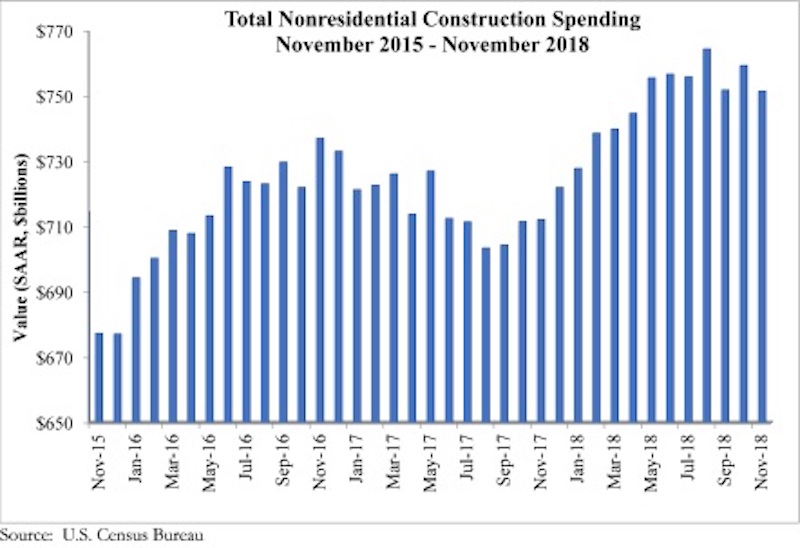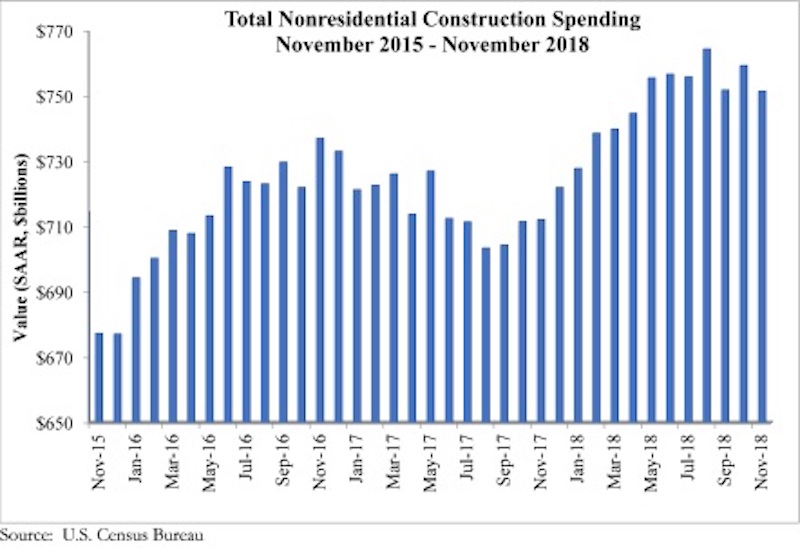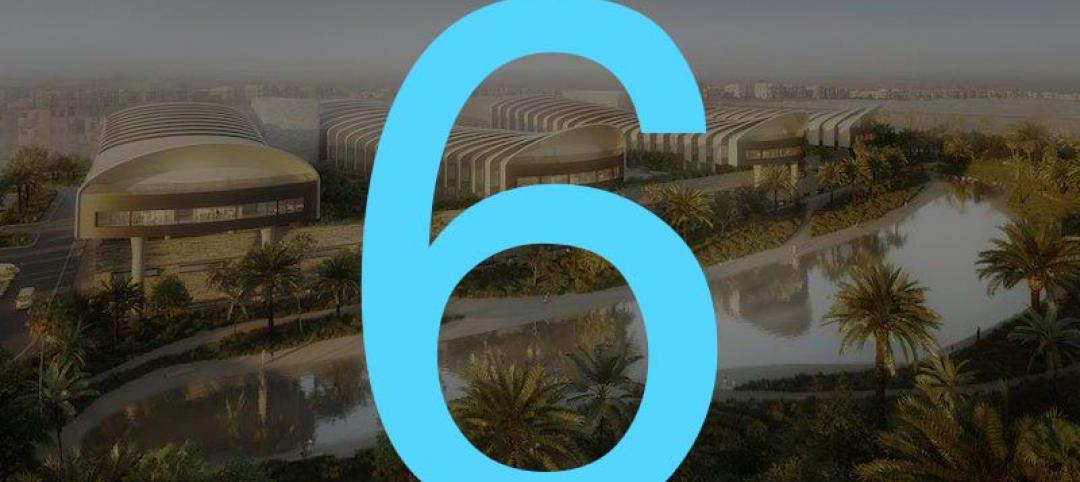National nonresidential construction spending declined 1% in November, according to an Associated Builders and Contractors analysis of U.S. Census Bureau data recently released. The release of November data, originally scheduled for Jan. 3, was delayed by the partial government shutdown.
Total nonresidential spending stood at $751.5 billion on a seasonally adjusted annualized rate, which represents a 5.5% increase over November 2017. However, 12 of the 16 nonresidential subsectors experienced monthly declines.
“One of the most interesting and surprising aspect of today’s release was evident of a dip in infrastructure spending, at least in certain categories,” said ABC Chief Economist Anirban Basu. “Spending on infrastructure was one of the key sources of nonresidential construction spending growth for much of last year, but declines in monthly construction spending were observed in the public safety, water supply and educational categories. This pattern is likely to prove temporary, given the healthier conditions of state and local government finances in much of the nation.

“The dip in November spending should not be viewed as a leading indicator of coming decline,” said Basu. “The government’s employment numbers indicate that contractors have continued to take on more staff, presumably because there is a growing amount of work to be done. While weather-related impacts are more severe at this time of year, rendering employment and other data more difficult to interpret, the U.S. economy still growing, and with more people working, that should ultimately translate into expanding nonresidential construction spending.

“However, there was a meaningful decline in spending in the commercial category,” said Basu. “Many brick and mortar retailers continue to struggle with the imposing presence of Amazon and other large-scale online sellers. This is translating into more store closings and probably fewer new stores being built. Still, the consumer segment of the economy remains strong, suggesting that other elements of the commercial segment, including fulfillment center and warehouse construction, will perform decently in 2019.”
Related Stories
Market Data | Sep 24, 2020
6 must reads for the AEC industry today: September 24, 2020
SOM's new waterfront neighborhood and a portable restroom designed for mobility.
Market Data | Sep 23, 2020
Architectural billings in August still show little sign of improvement
The pace of decline during August remained at about the same level as in July and June.
Market Data | Sep 23, 2020
7 must reads for the AEC industry today: September 23, 2020
The new Theodore Presidential Library and the AIA/HUD's Secretary's Awards honor affordable, accessible housing.
Market Data | Sep 22, 2020
6 must reads for the AEC industry today: September 22, 2020
Construction employment declined in 39 states and no ease of lumber prices in sight.
Market Data | Sep 21, 2020
Washington is the US state with the most value of construction projects underway, says GlobalData
Of the top 10 largest projects in the Washington state, nine were in the execution stage as of August 2020.
Market Data | Sep 21, 2020
Construction employment declined in 39 states between August 2019 and 2020
31 states and DC added jobs between July and August.
Market Data | Sep 21, 2020
6 must reads for the AEC industry today: September 21, 2020
Four projects receive 202 AIA/ALA Library Building Award and Port San Antonio's new Innovation Center.
Market Data | Sep 18, 2020
Follow up survey of U.S. code officials demonstrates importance of continued investment in virtual capabilities
Existing needs highlight why supporting building and fire prevention departments at the federal, state, and local levels is critical.
Market Data | Sep 18, 2020
6 must reads for the AEC industry today: September 18, 2020
Sagrada Familia completion date pushed back and energy code appeals could hamper efficiency progress.
Market Data | Sep 17, 2020
6 must reads for the AEC industry today: September 17, 2020
Foster + Partners-designed hospital begins construction in Cairo and heat pumps are the future for hot water.

















